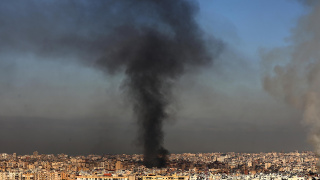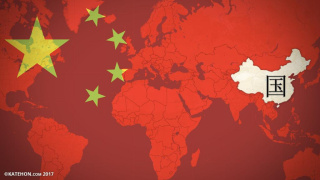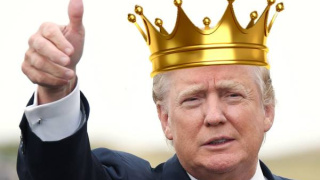What Can Force The European Union Withdraw From the “Nuclear Deal”?
Tension around the Persian Gulf does not subside. The US and Iran continue to shoot down drones, while the British tanker arrested by Teheran is still in the port of Bandar Abbas. The incidents in the Strait of Hormuz, though capable of leading to hostilities, are the result, not the cause of the conflict. The confrontation actually goes around the Joint Comprehensive Plan of Action (JCPOA).
The deal concluded in July 2015, which the media immediately dubbed “nuclear”, implies the refusal of the Islamic Republic of Iran (IRI) to develop nuclear weapons. In exchange, the United States and the European Union pledged to lift economic sanctions against Iran
.The crisis in the Strait of Hormuz - is a consequence, not a cause of conflict.
The withdrawal of the Donald Trump administration from JCPOA in May last year broke a new security system for the Middle East built by the EU and Russia. In response to the renewed US sanctions in August and November 2018, Iran also aggravated. Tehran began to violate the "nuclear deal" and increased the level of uranium enrichment above the permissible norm of 300 kg.
When Iran and the United States fail to come to a common decision, their only opportunity to win the fight is to use force in order to achieve concessions or to win other strong players to their side.
Tehran gave the EU a month ago two months to comply with JCPOA. If European companies that fled Iran on pain of American fines do not resume cooperation, Tehran will completely withdraw from the deal. In parallel, the Islamic Revolutionary Guard Corps (IRGC) threatens to close the Strait of Hormuz.
The position of the "cornered" Iran suits the USA. Testing the patience of Tehran, Washington carries out military maneuvers near its water borders. When unknown persons attack allied tankers, the State Department and the Pentagon hastily accuse Iran of aggression. The capture of the British tanker was very helpful. Earlier, when Trump asked Merkel and Macron to join the sanctions, they pointed him to the SC resolution. But now, when the European ship was taken hostage by the Persians, there is nothing to object to the White House.
The British Foreign Office has already hinted that if the tanker is not released, London will have to impose sanctions. Bearing in mind the story of Skripale’s poisoning, it can be assumed that the rest of the EU, out of solidarity, will also take measures against Iran. EU sanctions would be the funeral march of the wounded, but still alive, “nuclear deal.”
Escalation from Iran
So, the more Trump puts pressure on Iran, the more risky steps the Iranians are ready for, and the latter are undermining the EU's confidence in it.
Another step to exacerbate the crisis was the test by Iran of the new Shabab-3 ballistic missile. The projectile, made on the basis of the Chinese ICBM "Dongfeng-21" and the North Korean ballistic missile "Nodon", can reach the target at a distance of 1,100 km. The distance between the most western city of Iran, Kermanshah and Jerusalem is 1139 km. With further modification of the rocket can hit any object in Israel.
Iran’s testing of ballistic missiles was one of the pretexts for the United States to exit the UFHR. Although the Iranians say they are developing missiles for self-defense, Washington continues to insist on stopping the development. The United States refers to UN Security Council Resolution 2231, which bans Iran from launching missile tests.
Trump's disagreement with the nuclear deal leading to the Gulf crisis is caused by the Israeli factor. Israel a) considers Iran to be an existential threat, b) does not believe that Tehran is ready to abandon the development of nuclear weapons, and c) demands the withdrawal of pro-Iranian forces from Syria. Trump simply agrees with the arguments of Tel Aviv. It is no coincidence that his son-in-law is Jewish American.
Russian role
Given that this perception is shared by all political forces in Israel, there is no reason to expect softening on their part. The situation can be improved by a change of leadership in the White House. Until that happens, Russia continues to try to prevent an escalation between Iran and Israel. Last month, Security Council Secretary Nikolai Patrushev met in Jerusalem with colleagues from the United States and Israel. And the other day, the Russian Foreign Ministry announced the concept of collective security for the Middle East. Some Western media have reported that Trump changed his mind to launch rocket attacks on Iran after Vladimir Putin’s warnings.
Diplomatic measures are an important but not the only tool that Moscow uses to reduce escalation. In the fall, Russia transferred the S-300 air defense system to Syria and is ready to sell their improved S-400 version to Iran. The former close the Syrian sky from Israelis, the latter - Iranian airspace from the Americans.
Thus, the destructive position of the United States and Israel provokes Iran to retaliate, which can discourage the EU from retaining the JCPOA. Russia "pulls the rope" in the opposite direction, hoping that the EU will not bend again under its overseas partner. Although Russia does not benefit from the resumption of the “nuclear deal” and Iran’s entry into the European gas market, it is supporting its ally in Syria to prevent Iran’s war with the United States.












